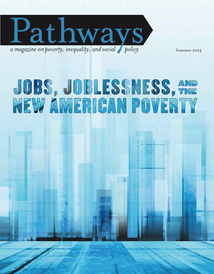Jobs & Joblessness

Should those of us who obsessively follow poverty statistics take heart from the positive labor market reports of late? In early July, the Bureau of Labor Statistics reported that unemployment declined to 6.1 percent, the lowest level since the collapse of Lehman Brothers some six years ago. We are also seeing a moderate drop-off in long-term unemployment and a moderate increase in the employment-population ratio. But what does this mean for poverty? Is a corresponding turnaround in poverty right around the corner?
Not necessarily. As Marianne Page points out in this issue, the jobs-poverty relationship has been weakening in recent decades, with the implication that the current expansion may not have the full poverty-reducing effect that we would like. Although economic expansions do still reduce poverty, they just don’t reduce it as much as they once did.
